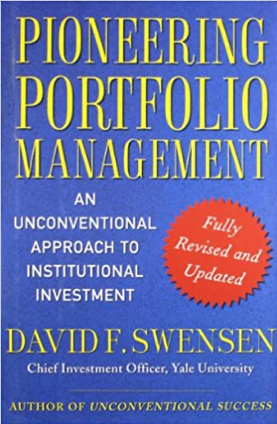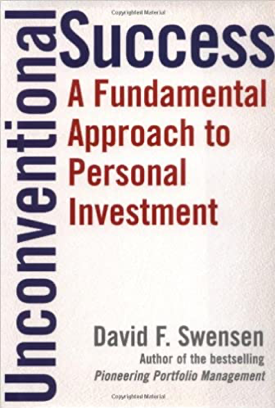2012.06.27

by David Swensen
In the years since the now-classic Pioneering Portfolio Management was first published, the global investment landscape has changed dramatically -- but the results of David Swensen's investment strategy for the Yale University endowment have remained as impressive as ever. Year after year, Yale's portfolio has trumped the marketplace by a wide margin, and, with over $20 billion added to the endowment under his twenty-three-year tenure, Swensen has contributed more to Yale's finances than anyone ever has to any university in the country. What may have seemed like one among many success stories in the era before the Internet bubble burst emerges now as a completely unprecedented institutional investment achievement.
In this fully revised and updated edition, Swensen, author of the bestselling personal finance guide Unconventional Success, describes the investment process that underpins Yale's endowment. He provides lucid and penetrating insight into the world of institutional funds management, illuminating topics ranging from asset-allocation structures to active fund management. Swensen employs an array of vivid real-world examples, many drawn from his own formidable experience, to address critical concepts such as handling risk, selecting advisors, and weathering market pitfalls.
Swensen offers clear and incisive advice, especially when describing a counterintuitive path. Conventional investing too often leads to buying high and selling low. Trust is more important than flash-in-the-pan success. Expertise, fortitude, and the long view produce positive results where gimmicks and trend following do not.
The original Pioneering Portfolio Management outlined a commonsense template for structuring a well-diversified equity-oriented portfolio. This new edition provides fund managers and students of the market an up-to-date guide for actively managed investment portfolios.

by David Swensen
The bestselling author of Pioneering Portfolio Management, the definitive template for institutional fund management, returns with a book that shows individual investors how to manage their financial assets.
In Unconventional Success, investment legend David F. Swensen offers incontrovertible evidence that the for-profit mutual-fund industry consistently fails the average investor. From excessive management fees to the frequent "churning" of portfolios, the relentless pursuit of profits by mutual-fund management companies harms individual clients. Perhaps most destructive of all are the hidden schemes that limit investor choice and reduce returns, including "pay-to-play" product-placement fees, stale-price trading scams, soft-dollar kickbacks, and 12b-1 distribution charges.
Even if investors manage to emerge unscathed from an encounter with the profit-seeking mutual-fund industry, individuals face the likelihood of self-inflicted pain. The common practice of selling losers and buying winners (and doing both too often) damages portfolio returns and increases tax liabilities, delivering a one-two punch to investor aspirations. In short: Nearly insurmountable hurdles confront ordinary investors.
Swensen's solution? A contrarian investment alternative that promotes well-diversified, equity-oriented, "market-mimicking" portfolios that reward investors who exhibit the courage to stay the course. Swensen suggests implementing his nonconformist proposal with investor-friendly, not-for-profit investment companies such as Vanguard and TIAA-CREF. By avoiding actively managed funds and employing client-oriented mutual-fund managers, investors create the preconditions for investment success.
Bottom line? Unconventional Success provides the guidance and financial know-how for improving the personal investor's financial future.
Rewritten by: Luo Xinying, Edited by: Du Zhixin, Wei Yiyi
The year 2019 marks the fortieth anniversary of China’s Reform &Opening-Up, once again, we meet at the turning point of history. What’s the next step for the game, is there any clear guidance? The answer is affirmative.
Our country is enjoying a good momentum of development, which does not come from the Washington Consensus nor the Beijing Consensus. China’s experience has proved that both the visible hand and the invisible hand are crucial: the visible hand, stands for the government-led reform, and would yield benefits for reform and opening up; the invisible hand, stands for the Marginal Power represented by the private sector, and would improve economic efficiency and tax collection, create jobs and employment opportunities.
Provided that we want to protect and expand the benefits form reform, three simple but mandatory agreements are to be made and followed: No.1 Private ownership must be recognized, protected and treated equally with public ownership constitutionally, both ownerships are scared and inviolable;No.2 Make further clarification of the principal position of market economy, “deepen economic system reform by centering on the decisive role of the market in allocating resources”, as President Xi addressed in the third Plenary Session of the 18th CPC Central Committee;No.3 Implement the guiding principles of “comprehensively promoting law-based governance” of the fourth plenum. The rule of law is essential for economic growth, irreplaceable to protect private ownership, and necessary to encourage innovation and entrepreneurship.
Above are three rules for us to avoid falling into the Middle-income Trap. Assuming that we are breaking systematic barriers to private enterprises’ participation in market economy, and boosting innovation and entrepreneurship of our society, then we are heading towards a promoting direction. We are marching in the path of light, regardless of the ups and downs of Sino-US relationship, the drop in GDP growth rate, or the monetary policy.
These principals also apply on knowing how better to run a business: don’t be hedged by rules and regulations at the beginning, pay more attention to your survival, and you’ll learn more when you start your second business.
For many years, Huawei has been the only Chinese company on the list of the Top 50 R&D Spenders. Regardless of the economy and its income, what Huawei has been doing is investing in its future, dedicated to R&D, continuously and resolutely. This provisional work underscores Huawei’s accomplishments, making Huawei anindustry leader.
So, there are standard answers on how to run a company,which could be summarized as concentration and professional dedication, continuous investment on innovation and trying harder in R&D. Entrepreneurship is also important, every single company needs entrepreneurs to push aside all obstacles and difficulties, to implement strategies and ideas. We, as investors, are destined to look for such outstanding entrepreneurs and their companies, invest in them and partner with them.
At this key point of history, a country, a company, or asingle individual, will all need to find the right path. Four decades after the Reform and Opening-up, it’s time to learn from our experience and stop “wadding across
